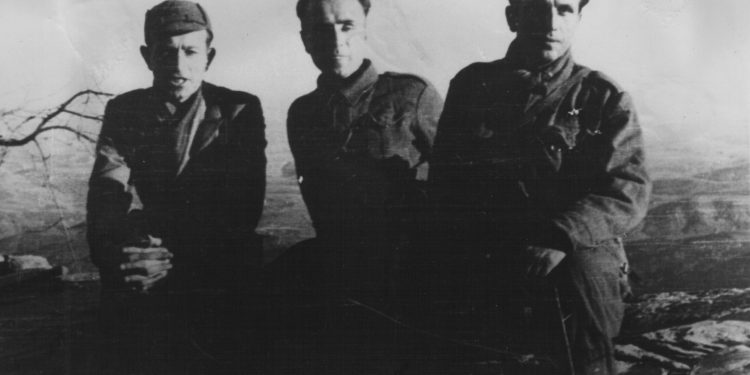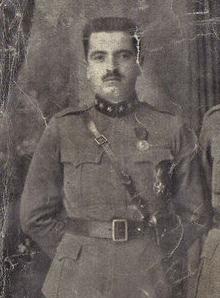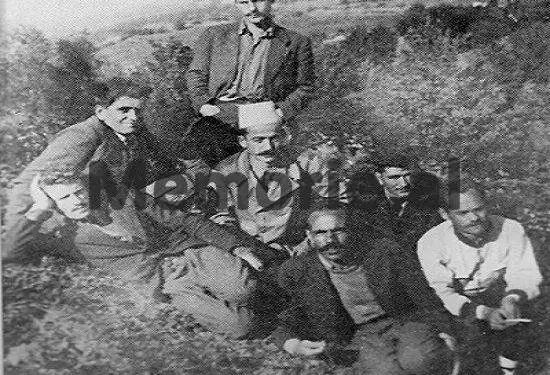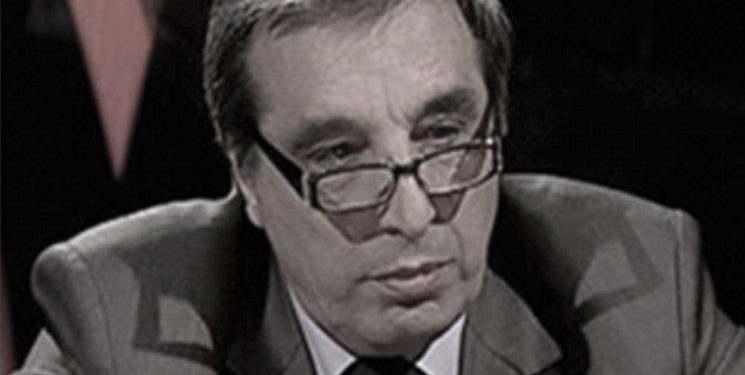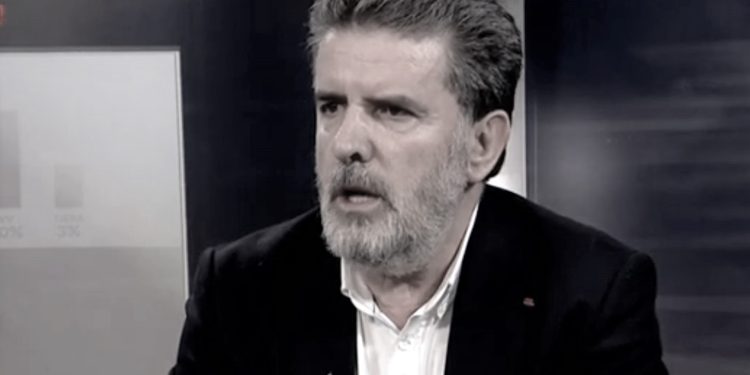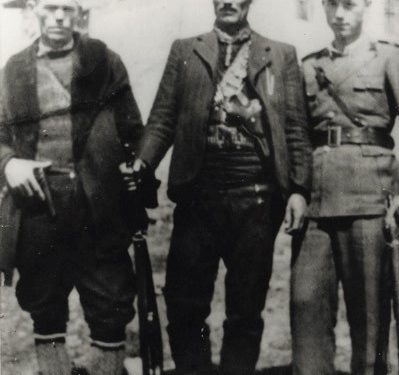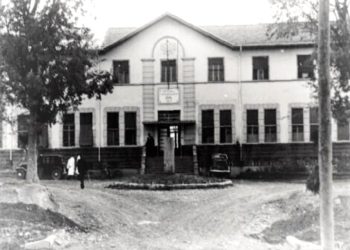By Qerim LITA and Halim PURELLKU
The third part
Memorie.al / The fall of Dibra in the hands of the communist forces caused dissatisfaction among the Albanians of this city because the power was not administered by the Albanians, but by the Macedonians. Tempo held a speech in Kicevo, where he asserted that; “soon the Macedonian flag will be raised and, in case the reactionaries oppose it, it will be defended by the Albanian National Liberation Army”. This statement, Haxhi Lleshi considered that; it was “very appropriate”, but expressed concern that; “the reactionaries found an opportunity to make propaganda against us, as communists who unite with other nations”.
Continues from last issue
At the time when fierce fighting was taking place in the vicinity of Kîçova, in Peshkopi, with the help of Faik Shehu, partisan units were introduced. The largest number of partisans was Montenegrins and Italians. On October 9, 1943, the leaders of the “Bashkimi Dibran” Committee asked Faik Shehu that; “The communists should leave the city until the early hours of the morning; otherwise the Albanian forces will enter the city”. This ultimatum was ignored.
The leaders of the Committee entered Peshkopi with their own forces on October 13. That same day, they formed the National Committee, under the leadership of Fiqiri Dines, Riza Drini and Selim Jegeni. On this occasion, Riza Drini gave a speech where, among other things, she declared: “We will fight against Germany. We are friends with the Great Allies, England and America, who will give the peoples freedom to oppress and peace and justice to the world”. Then, the bodies of the prefecture were elected: the prefect, the mayor, the district and district commander, and the assembly of the gendarmerie took place.
The partisan forces were helped by the detachment of Esat Ndreu and a battalion of the Macedonian-Kosovo Brigade, composed of Serbian and Montenegrin partisans. The deployment of Serbian-Montenegrin forces in Peshkopi further aggravated the relations between the two Albanian political wings. The nationalist leaders asked Faik Shehu, who sided with the Albanian National Liberation Front, to urgently withdraw the Serbo-Montenegro forces from the region of Peshkopia.
He promised that these forces would leave, but this withdrawal did not take place. Thus, the District Commander of Peshkopia Prefecture, Miftar Kaloshi, ordered the mobilization of the entire population of Dibra, for the expulsion of enemy forces from this Albanian province. In this very dramatic situation, the representative of the English military mission intervened, who gave an ultimatum to the Albanian communists to remove the foreign partisans from this province.
However, the Albanian communist leaders did not keep their word this time.
As a result, on October 18, war broke out between Albanian nationalist forces and Yugoslav-Albanian communist forces. On October 19, the English captain intervened again, who asked Esat Ndreu to immediately stop the fratricidal war; to hand over the cannons and barracks; as well as to remove foreigners from the Bishopric. He warned Esati that, if this request was not implemented, “he (Esati) was responsible for the war and that I will inform London about this”.
His intervention helped to achieve the ceasefire. Further, the English captain mediated the talks that took place between the two parties. The Albanian Committee was represented by Abaz Kupi and Fiqiri Dine, while the Albanian National Liberation Front was represented by Esat Ndreu. In conclusion, an agreement was reached for the partisan forces to release Peshkopina, and on October 21, the partisan forces settled in Dibër te Madhe. Here were Svetozar Vukmanovic-Tempo and Haxhi Lleshi. In front of the Battalion headquarters in Dibër, Haxhi Lleshi, Tempo and Faik Shehu gave speeches.
According to a report by Sotir Vullkani, “in these speeches that were applauded a lot, cooperation and fraternity in the war with the neighboring Yugoslav, Greek and Bulgarian peoples was emphasized, Parija was unmasked, and the National-Liberation war was popularized…”! Since the situation in Dibër was getting worse, at the request of the Dibër nationalist party, Xhemë Gostivari, Mefail Zajazi, Aqif Reçani, with their forces, went to help the Dibër people. On October 27, Aqif Lleshi, with his own forces, went to Radastush and demanded that the Albanian gendarmerie be withdrawn from this municipality, in order to establish the Macedonian communist government there.
After the Albanian gendarmerie refused to withdraw, the war broke out which lasted about 8 hours. At its conclusion, Radastushi fell into the hands of the communists. As soon as they were informed about the capture of Radastush by Aqif Lleshi, the Albanian nationalist forces, led by Xheme Gostivar, Mefail Zajaz, Shahin Cam and Fik Maliq, attacked Radastush on October 28 and, after a short fight, this municipality again fell into the hands of the Albanian nationalist party.
At the moment when the Albanian forces were concentrated in Dibër, Svetozar Vukmanovic-Tempo, with the two partisan battalions and the Albanian detachment of Hamdi Dema, entered Kirçovo again. In the military barracks, fierce fighting took place between the two opposing forces. The Albanian nationalist fighters heroically defended the barracks. In these battles, they distinguished themselves in a special way; Halim Sali Rexhja, Begzat Vuli, Sulcja i Aranjeli, Shefki Jagodina, Elez Jagodina, Habib Kaleshi and Medi Letniku.
About the attack he was going to make on Kîçovo, Tempo informed Haxhi Lleshi to whom he asked that his forces also participate in this attack. In the report of the headquarters of the battalion of Dibra, sent to the General Headquarters of UNÇSH, it was said that: “Haxhiu was prepared with 120 partisans, to go to the aid of the Macedonian comrades, who wanted to attack Kicova, but after this situation, leaves for Radastush and, that same evening, with 80 partisans commanded by him, begin the fight that lasted all night and the next day until 4 o’clock in the afternoon. Many partisans, tired and exhausted from the fighting and without food, retreat to Dibër, where they arrive in the morning of the 31st.
Nationalist forces had reaped successive successes in the fighting in Radastush. Fierce fighting also took place in the city of Dibra. According to the same report, the Albanian nationalist forces, “encouraged by the successes there (Radastush), attack with all their might and completely by surprise (as we did not expect such a quick attack), almost without resistance, they entered the eastern part of the city, where they entered the house and, from there, continue to fight. The attack was fierce and lasted all night in this part; on the other hand, i.e. Sabri Bey Maqellara attacks from V.P. (North-west); while from the south, Ukë Cami attacks”.
At the time, when a fierce war was taking place in the city of Dibra, Xheme Gostivar received the news about the fall of Kicevo in the hands of the Yugoslav communist forces. He, together with Mefail and Aqif Reçan, left Dibra and headed for Kîçovo. Xhema and Mefaili entered Kîçovo from the side of Gostivar, while Aqif Reçani was placed on the lower side, coming out behind the partisans.
The fighting lasted until the evening hours and ended with the defeat of the partisan forces, which retreated towards Poreča, leaving several dozen soldiers dead, among them the commander of the Macedonian-Kosovar battalion, a Montenegrin. From among the Albanians, Begzat Vuli, Sulcja i Aranjeli, Habib Kaleshi and several other soldiers were killed.
With the restoration of Albanian power in Kîrçovo and Peshkopi, the positions of the Yugoslav-Albanian communist forces, which now had only the city of Dibra in their hands, were greatly weakened. This situation lasted until November 16, 1943, when the volunteer forces of the “Bashkimi Dibran” Committee triumphantly entered this city, expelling the partisans in the direction of Karaorman. On August 14, 1944, the Albanian partisan unit was formed in Kîrçovo.
She was soon joined by a considerable number of Albanian volunteers from the region of Struga, Dibra and Kîrçova. On August 26, in the mountains of Karaorman, this unit formed the 4th Albanian brigade, which, initially, numbered about 450 fighters, while, over time, this number went up to 5000. This Albanian brigade took an active part in the fighting between Yugoslav partisan forces and Albanian volunteers for the capture of Struga, Kirçova, Gostivar and Tetova. Afterwards, the brigade was deployed in the region of Presheva and Kumanovo, where it participated in the disarmament of the population.
During the autumn of 1944, the leadership of the Communist Party of Yugoslavia, and especially the Communist Party of Macedonia, through demagogic slogans, tried to create divisions within the Albanian nationalist political and military structures in these areas, which at that time had created a powerful union political and military. During the month of September, fierce fighting took place between the Yugoslav communist brigades and the Albanian volunteer forces.
The Yugoslav communist forces, although they were superior in the number of soldiers and in armaments, failed to occupy the liberated Albanian lands. Aware of this situation, the commander of the General Staff of the Macedonian National Liberation War, Mihajlo Apostolski, in the second half of September, traveled to Sofia, where he reached an agreement with the leader of the Communist Party of Bulgaria that the Bulgarian partisan brigades, to settle in Macedonia.
According to the agreement, these brigades had to operate from Kriva-Pallanka, in the direction of Kumanova. In addition, Apostolski, with the consent of the Bulgarian communist leadership in Sofia, mobilized the soldiers of the former fascist Bulgarian army, originating from the territory of Macedonia. On September 27, 1944, the General Staff of the LNCM informed the Headquarters of the IV Operational Zone that: “General Apostolski in Sofia accepted all the Macedonians who were in the Bulgarian army and armed them with Soviet weapons and organized many units”.
Earlier, between the General Staff of the LNÇJ and that of the LNÇSh, an agreement was reached that Albanian partisan brigades should be placed in these areas. The sending of Albanian partisan brigades to the aforementioned provinces was a long-standing request of the leader of the Communist Party of Yugoslavia. The XVIII Brigade of UNÇSH operating in the district of Dibra, for its cleansing from the nationalists, at the request of the Macedonian headquarters, participated in the battles of Kîçova in September 1944. About 1,300 Albanian partisans of this Brigade and Macedonian partisans of the III Brigade, attacked on September 21, 2000 Albanian nationalists, led by Xheme Gostivari and Mefail Zajazi.
The commander of the 18th Brigade, Petrit Dume, reported: “After traveling all night, we arrived on the hills of Garant, Shutovë and Mahmutaj districts. On the other side of these streets, the forces of the aforementioned Brigade (3rd Macedonian Brigade) were operating. The surrounding villages were reactionary… the forces of our battalion learned and advanced with war and heavy fire, until Kastriot village, which we took with little struggle, chasing the reactionaries who defended it”.
Also in the History of the National Liberation War, it is written that; on September 23 “the forces of the 4th battalion of the 18th brigade attacked from all directions, but, as predicted, the enemy’s resistance was very strong, especially when they defended themselves inside the houses”. In this case, the “enemies” were the local Albanians, who were defending their homes. The fighting was bloody. Among the partisans killed was Ibe Palikuqi, who was falsely presented by communist historiography as having been killed in a fight with the Germans, but she was a victim of the civil war.
These fights lasted until November 17 of that year, when the forces of the communist, Yugoslav-Albanian coalition took Kicova and its surroundings. It is important to point out the fact that, a few days before Kirçova was taken, fierce fighting took place between the Albanian Kreshnik (volunteer) units led by Xhemë Gostivari and Mefail Zajazi, on the one hand, and the forces of the Yugoslav communist coalition- Albanians.
According to a plan drawn up by the 16th Yugoslav-Macedonian Corps, it was foreseen that between 7-8 November 1944, the military units of the 48th Macedonian Division, together with the 4th Albanian Brigade and the 4th Battalion of the Brigade of the 18th Albanian Attackers, to enter the villages of Tuhin, Dolence, Papradishte; The 15th Macedonian Brigade had to attack the villages of Sërbicë, Aranjall and Novoselle, while the 6th Macedonian Brigade attacked the villages of Prenkë, Goranë and Shutovë.
Initially, the partisan forces advanced by entering several Albanian villages, where they began to burn houses and terrorize the civilian population, which revolted the Albanian population, which mobilized throughout the Albanian settlements and with a powerful counterattack, forced the numerous Macedonian-Albanian brigades retreated with great losses.
In the telegram that the headquarters of the 48th Division sent to the headquarters of the XVI Corps, it was said that; in the fierce fighting that took place in the direction of the village of Sërbicë, the partisan units were broken very quickly, because the Albanian forces, with the great help that came to them from Gostivar, forced the Macedonian brigades to withdraw from the Albanian settlements…”!
In addition to the area of Kicova, fierce fighting at that time also took place in the area of Treska, namely in Karshijaka and Derven in Skopje. On October 27, 1944, the Headquarters of the 42nd Division of the LNCJ for Macedonia reported to the Headquarters of the First Corps that between October 24-25, 1944, the units of this division had fought fierce battles with the Albanian volunteer forces, in the sector Gllumovë-Shishovë, Kushapek-Gërcec, as well as in the sector Sallarevë-Gurgunicë-Zhelinë. “…The fighting, – it was emphasized in the report, – was very fierce and the Albanians were dominant, both in people and in weapons…”!
From the above, you can also understand the reason for the withdrawal of the VI and VIII brigades…! The fighting in this area lasted until November 15, when a delegation of the Albanian party, consisting of; Shefqet Ornaça, Qazim Lusha, Qemal Skenderi and Mehmet Bushi, traveled to Zhestov (Gjorce Petrov of Skopje), to talk with the headquarters of the Macedonian troops.
In conclusion, an agreement was reached according to which the two sides would not confront each other with weapons, while in Tetovo; units of the Macedonian UNC would enter. The latter promised the Albanian delegation that in Tetovo, no arrests would be made, with the exception of those who had “committed crimes”, proven during the occupation period.
As expected, as soon as the Albanian partisan brigades were deployed, UNÇJ units as well as Chetnik forces took a harsh action against the Albanian population, from Struga to Kumanovo, killing and massacring hundreds of innocent Albanians, thousands of others were arrested and placed in concentration camps, in military barracks and other localities, such as in the Tobacco Monopoly in Tetovo, in the military barracks in Kîçovo and Gostivar, in the schools of Saraqina and Grupçin, etc.
These repressive actions were carried out by order of the Macedonian high political and military leadership. This was evidenced by the order of the headquarters of the XV Corps of the LNCM of November 18, in which the partisan brigades were asked, on November 19, to place the city of Gostivar under a blockade, then to collect all men capable of arms and to place them in the trenches, and, in some suitable building, and at the same time, to collect all the armament, ammunition, and other military arsenal.
An event that deeply shocked the broad Albanian opinion was the massacre carried out in the village of Bllacë in Skopje, on November 18 by the XVI Brigade, where, from the already documented data, it appears that; 111 men of this village were massacred. Partisan crimes and massacres against the Albanian civilian population pushed the vice-president of the People’s Front of the Federal Republic of Macedonia, Hasan Shukri, to react. In a meeting that was held on December 7, 1944, he pointed out some unpleasant and arbitrary events on the part of the partisan forces towards the Albanian population.
He, among other things, said that; “in the village of Sopot in Kumanovo, 66 villagers were killed, even though this village, in the past, helped the partisans; in the village of Malishevë, 42 people were killed; in the village of Izvor, 40 people; in the village of Vaksinca, 16 people. 5,000 people have been imprisoned in Tetovo, 17 of whom have died of hunger…etc” After this reference by Hasan Shukri, the meeting decided to issue a circular in which it would be clarified who could be imprisoned, tried, controlled etc. This regulation would be sent to the army, OZNA and the Presidium.
Parallel to these repressive measures, the new Macedonian communist government, in the month of December, organized gatherings in the Albanian settlements; the Albanian population was forcibly taken out in the city squares, where some Albanian communists also gave speeches. In January 1945, Liri Belishova, a member of the Political Bureau of the K.Q. of the NPSH, which participated in the Balkan Youth Conference in Skopje, gave a speech in the spirit of brotherhood-unity, without a word of criticism, towards the behavior of the Yugoslav army towards the Albanian people.
She declared: “We have strengthened our brotherhood with the Yugoslav youth in the war for Dibra and in the wars of other territories of Yugoslavia,” and opposing you; “numerous provocations, to force us to fight against each other, to raise our national liberation army against Marshal Tito’s National Liberation Army. Despite all these efforts, we did not stand against each other, the sympathy and love of the Albanian youth towards the Yugoslav youth is very great today”.
Unlike Liri Belishova and the Albanian communists, the Albanian intelligentsia of that time thought that, irritated by the barbaric behavior of the Yugoslav communist forces towards the Albanian civilian population, it was necessary to establish an illegal Albanian organization, whose final goal was: The liberation and unification of the captive Albanian lands with Albania”.
Among the most important reasons, why the Albanian intelligentsia of Skopje decided to act illegally, were; “the denial of the right to self-determination, of the Albanians in Kosovo and in the North-Western parts of Macedonia”, as well as the efforts of some city officials, that Albanian schools should not be opened in Skopje, but only Turkish ones, because, according to them, “in In the city of Skopje, there are no Albanians, only Turks”.
Albanians were not only denied the right to self-determination, but they also took away some few civil and national rights that were guaranteed by the decisions of ASNOM, such as: free use of the national flag, proportional participation in popular councils, the use of the Albanian language, the equal inclusion of Albanians in the administration of the municipalities where they lived, etc. The communist authorities of Skopje allegedly justified the denial of these rights with the “dissatisfaction of the Macedonian population in the western parts of Macedonia”, which was said to have been “double enslaved during the Albanian occupation”, therefore it “accepted them with a great reserve these changes and felt as if distanced”.
This reserved attitude of the Macedonian population, according to ASNOM member Jordan Ballazheski, was due to; “through state facilities, next to the state flag, there are also Albanian flags; Albanians participate equally during the elections of National Liberation Councils, whether of cities or villages; they present the request that in the plenum and in the executive councils, they have more of their representatives; they also raise the issue of the administration itself, which must be managed in parallel with our (Macedonian) administration, therefore they demand the same number of employees in the administration; in the state institutions in office, all the Albanian officials of the previous regime, who came from old Albania, etc., remained!
According to Blazheski, in order to stop the “Greater Albanian” policy in Macedonia, the following urgent measures had to be taken by the ASNOM Presidium: “The Albanian officials who came from Tirana should be dismissed; the Turks should be given more positions and rights, which for now cannot be provided by the Albanian-majors; at the same time, the rights and obligations are given, not according to the number of the population, but according to the participation in the national liberation war”. Memorie.al




